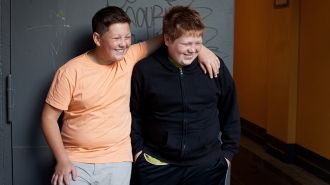- Our studies
- Our research
- Publications and resources
- Data access and training
- About
- News
- Events
- Get in touch
- Join our mailing list
Welcome to our news and blogs section. Here you’ll find the latest developments and insights from across our longitudinal studies.
Growing Up in Digital Europe (GUIDE) is the UK pilot of a major European initiative to create internationally harmonised data for research on child development and wellbeing.

The Economic and Social Research Council (ESRC) today published its Longitudinal Studies Strategic Review, a report by an international panel, which was commissioned by the ESRC to review its investment in longitudinal studies.

In 1969, more than 10,000 11-year-olds, taking part in the National Child Development Study (NCDS), were asked to write an essay imagining what their lives would be like at 25. Fast forward 50 years, and we contacted a number of study members to share their essay with them and see how their lives had unfolded.
A round-up of selected journal papers and other research published in March using CLS study data.

Disadvantaged children born at the start of the 21st century weighed up to 5kg more in their childhood and early teenage years than those from more privileged backgrounds, a new study has found.
A round-up of selected journal papers and other research published in February using CLS study data.
A round-up of journal papers and other research published in December and January using CLS study data.
Pupils taking the ‘EBacc’ curriculum are only slightly more likely than their peers to go to university, according to a new study.

Just under half of young people in the UK had tried alcohol by the time they were 14, with more than one in ten confessing to binge drinking, new findings from the Millennium Cohort Study have revealed.

Seventeen per cent of UK parents have let their children drink alcohol by the age of 14, according to new findings from the Millennium Cohort Study.

Teenagers’ own career aspirations could be perpetuating the gender pay gap, researchers at the Centre for Longitudinal Studies (CLS) suggest.
A round-up of selected journal papers and other research published in November using CLS study data.

One in five young people born in the UK at the turn of the century was obese by the age of 14, and a further 15 per cent were found to be overweight.
Ryan Bradshaw
Senior Communications Officer
Phone: 020 7612 6516
Email: r.bradshaw@ucl.ac.uk